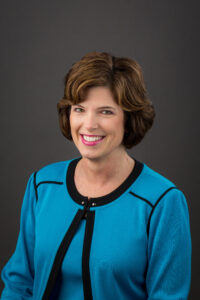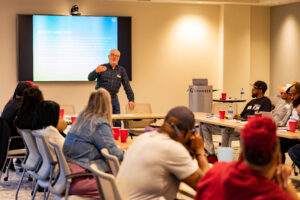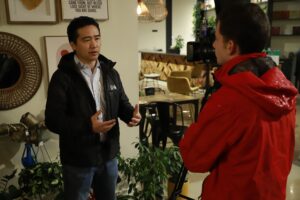Rich Bailey
The headlines are full of news about artificial intelligence, blockchain, virtual reality and other bold, disruptive technologies moving ever closer to everyday relevance. The visions can be so compelling — and the promotion so relentless — that it’s often hard to distinguish blue skies from bottom lines.
TerraTal is a four-year old startup using machine learning—a type of artificial intelligence—to shake up job recruiting right now. The company is generating revenue and profit, and is in the process of moving to Chattanooga to continue developing both its business and its technology.
“TerraTal is a sophisticated recruiting platform based on structured data that is designed to create a paradigm shift in how you find and assess talent,” says Chris Baumgartner, TerraTal’s president and cofounder.
TerraTal reverses the traditional recruiting model, in which an employer develops a large pool of applicants and then looks for reasons to eliminate resumes to create a manageable set of candidates. Instead, TerraTal builds the candidate pool, crunches the data and narrows the field down to three to five candidates who have been assessed for qualification and cultural fit.
“Employers can spend more time reviewing meaningful folks, focusing on what it is about these individuals that would merit an invitation into what I call the art component of the interview process,” Baumgartner says. “We’re the science-based piece of it. The art is determining whether you want to work with that individual after you’ve assessed the quantitative component of whether or not they are culturally viable.”
How It Works
Assessing a candidate’s probability of a good cultural fit with an employer is the most important data point in what Baumgartner describes as a granular approach that quantifies all the familiar factors that an employer might consider, including skills and experience, as well as readiness to change jobs, desired compensation and leadership experience.
“How well folks align with the work environment they’re going to be asked to perform in is probably the biggest indicator of success in a job,” Baumgartner says. “We didn’t expect it to have as big an impact as it has when we began developing our system, but our clients are very reliant on that as an indicator. Some won’t even consider a candidate that doesn’t line up well with work environment expectations.”
The key to TerraTal’s approach, according to Baumgartner, is working with highly structured data. Where other data-driven recruiting approaches work with the language of resumes as created by individuals, TerraTal asks both professionals and employers to answer a specific set of questions to frame the experience and personal traits of job seekers, as well as job requirements and work environment.
The system compares the structured data on each side to create the best possible match. Over time, TerraTal’s system learns as it comes to include new data points about the success or failure of hired candidates.
“Everything we do revolves around making our system smarter with every data point that enters the platform, whether that be from professionals or employers,” Baumgartner says. “By looking at the structured cohorts of data we’ve been able to generate, we can tell whether or not a person is in good alignment with folks who have come before them in that same type of a role. We compare them, incorporate the comparison into the algorithms and say this person aligns well with folks who have had long tenure in this space.”
Using predictive modeling based on highly structured data allows more accurate matching than simply working with keywords. For example, consider a search for a sales person in health care with medical device technology experience specific to cardiology. A search based on keywords might include an administrative assistant to a hospital vice president of cardiology as a fit for that job description.
“Our system is so specific that you can choose all of those skills and it will only produce the individuals that have flagged those as being areas of expertise and skill in that industry and that specialty—nobody else gets brought in,” Baumgartner says. “It’s an extra investment for us to do it this way. It has taken discipline and a lot of manual effort in a world that’s trying to get away from manual effort in technology.”
TerraTal covers all career fields, but is particularly suited to positions that generate a high volume of applications, such as customer service, accounting and sales, because of its ability to narrow a huge group of applicants to a few candidates. Health care, insurance, information technology and financial services have been the company’s most successful markets.
Growing in Chattanooga
TerraTal was founded four years ago in Texas. It is fully funded by partners and investors and is already profitable. Now Baumgartner — who lives in Chattanooga — is looking for office space to complete a move to Chattanooga in the next six months. Over the next 12 to 18 months, the company plans to invest in marketing and sales, growing its staff from under 10 employees to about 20, then begin working to evolve its technology in late 2019 or early 2020.
“Our business is heavily dependent upon top-tier tech talent,” Baumgartner says. “Chattanooga is fast becoming known as a choice destination for technology resources, and we think it will be easier to attract talent here than it would be elsewhere. As we evolve, we’re going to need more diverse skillsets in development, particularly in the AI space where we’re looking to invest heavily in the future.”
Baumgartner and his partners are also planning to spin off a second company, TerraTal Technology Services. Currently a part of TerraTal, it already provides project management, general development and web-based support services to other companies and will become a separate company when TerraTal moves to Chattanooga. The partners also have a third, unrelated company called HealthScreenU that provides diagnostic laboratory testing that may or may not move to Chattanooga when the others do.
Learn more about TerraTal here.




